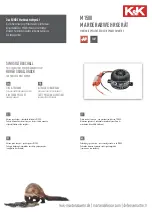
LISA-U series - System Integration Manual
UBX-13001118 - R17
Advance information
Product Testing
Page 170 of 190
Component assembly on the device; it should be verified that:
o
Communication with host controller can be established
o
The interfaces between module and device are working
o
Overall RF performance test of the device including antenna
Dedicated tests can be implemented to check the device. For example, the measurement of module current
consumption when set in a specified status can detect a short circuit if compared with a “Golden Device” result.
Module AT commands are used to perform functional tests (communication with host controller, check SIM card
interface, check communication between module and GNSS, GPIOs, etc.) and to perform RF performance tests.
5.2.1
‘Go/No go’ tests for integrated devices
A ‘Go/No go’ test is to compare the signal quality with a “Golden Device” in a position with excellent 2G/3G
network coverage and after having dialed a call (see the
u-blox AT Commands Manual
[3], AT+CSQ command:
<rssi>, <ber> parameters).
These kinds of test may be useful as a ‘go/no go’ test but not for RF performance measurements.
This test is suitable to check the communication with host controller and SIM card, the audio and power supply
functionality and verify if components at antenna interface are well soldered.
5.2.2
Functional tests providing RF operation
Overall RF performance test of the device including antenna can be performed with basic instruments such as a
spectrum analyzer (or an RF power meter) and a signal generator using AT+UTEST command over AT interface.
The AT+UTEST command gives a simple interface to set the module to Rx and Tx test modes ignoring 2G/3G
signaling protocol. The command can set the module:
In transmitting mode in a specified channel and power level in all supported modulation schemes (single slot
GMSK, single slot 8PSK, WCDMA) and bands 2G, 3G
In receiving mode in a specified channel to returns the measured power level in all supported bands 2G, 3G
See the
u-blox AT Commands Manual
[3], for AT+UTEST command syntax description.
See the
End user test Application Note
[21], for AT+UTEST command user guide, limitations and examples
of use.
















































